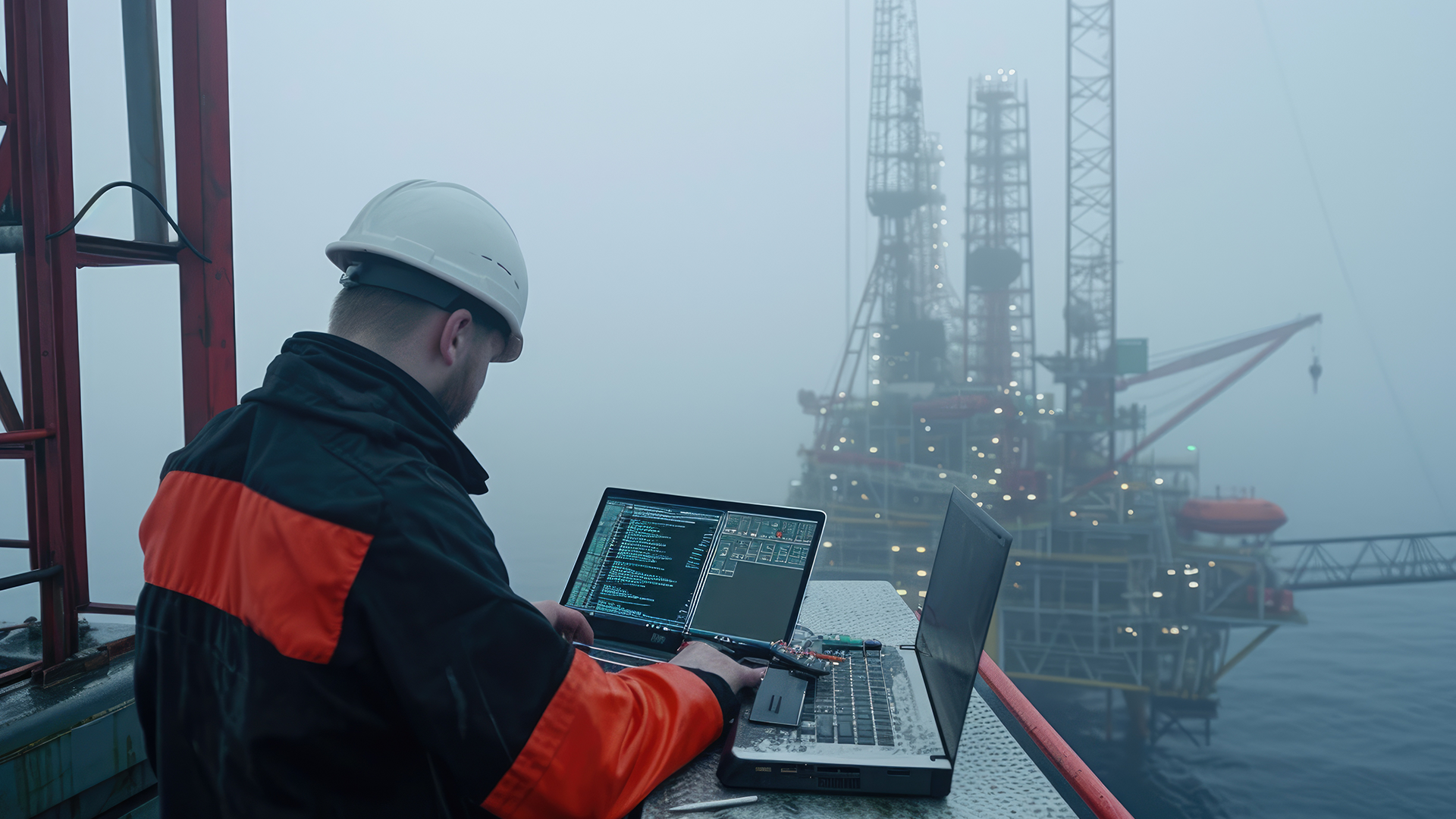
Thank you
Our team of industry domain experts combined with our guaranteed SLAs, our world class technology .


Get Immediate Help
The oil and gas industry is the backbone of Saudi Arabia’s economy, driving energy production and global trade. But as the sector embraces digital transformation, it’s also becoming a prime target for cyber threats. Critical infrastructure, interconnected systems, and valuable operational data make the oil and gas sector a tempting prospect for cybercriminals.
Enter the cyber maturity assessment—a proactive strategy to evaluate and enhance an organisation’s cybersecurity posture. For oil and gas companies in Saudi Arabia, this assessment is more than just a check-up; it’s a comprehensive roadmap to securing operations against modern threats.
In this blog, we’ll dive into what a cyber maturity assessment entails, its importance in the oil and gas industry, and how it addresses the unique challenges faced by organisations in Riyadh, Jeddah, and beyond.

A cyber maturity assessment is a systematic evaluation of an organisation’s cybersecurity posture. It assesses how well an organisation manages, protects, and defends its digital infrastructure against cyber risks. The assessment measures security maturity levels using frameworks and benchmarks to identify weaknesses, improve defences, and align security strategies with industry standards.
For the oil and gas sector, a cyber maturity assessment evaluates critical areas such as:
- Risk Management: How well threats and vulnerabilities are identified and mitigated.
- Incident Response: Preparedness for detecting, responding to, and recovering from cyber incidents.
- Regulatory Compliance: Adherence to oil and gas safety regulations and cybersecurity standards.
- Security Posture Assessment: Overall readiness to tackle modern cyber threats.

1. Targeted Cyber Threats
The oil and gas industry is a high-value target for cyberattacks. Threat actors, including nation-state hackers and ransomware groups, seek to disrupt operations, steal sensitive data, or cause environmental and financial damage. A cyber maturity assessment helps identify vulnerabilities and implement safeguards to protect critical assets.
2. Complex Infrastructure
Oil and gas facilities rely on complex, interconnected systems, including SCADA, ICS, and IoT devices. These systems are vital for production but are often vulnerable to cyberattacks. A thorough assessment ensures these systems are secure and continuously monitored.
3. Compliance with Regulations
Saudi Arabia has stringent regulations for critical infrastructure, including those outlined by Saudi Aramco and global standards such as NIST and ISO 27001. A cyber maturity assessment helps organisations ensure compliance with these regulations, reducing the risk of fines or operational shutdowns.
4. Protecting National Interests
As a global leader in energy, Saudi Arabia’s oil and gas sector plays a pivotal role in national security and economic stability. Strengthening cybersecurity through maturity assessments ensures the sector remains resilient against cyber threats.
5. Maintaining Operational Safety
Cyberattacks on oil and gas infrastructure can lead to safety risks, such as equipment malfunctions or environmental hazards. A proactive cybersecurity strategy minimises these risks, ensuring safe and efficient operations.

1. Risk Management for Oil and Gas
- Evaluates how well organisations identify, analyse, and mitigate risks to critical infrastructure.
- Incorporates tools like threat intelligence and vulnerability assessments.
2. Security Posture Assessment
- Measures the effectiveness of current security practices.
- Identifies gaps in controls like access management, endpoint protection, and network security.
3. Incident Response Preparedness
- Assesses the organisation’s ability to detect, respond to, and recover from cyberattacks.
- Ensures organisations have robust cybersecurity incident response plans in place.
4. Compliance with Oil and Gas Safety Regulations
- Evaluates alignment with local and global cybersecurity standards.
- Provides guidance for meeting compliance requirements, such as energy cybersecurity solutions mandated by regulatory bodies in Saudi Arabia.
5. Threat Management and Monitoring
- Reviews intrusion detection systems and continuous monitoring capabilities.
- Recommends strategies for cyber threat management in operational environments.

1. Ransomware Attacks
Ransomware poses a major threat to oil and gas companies, disrupting operations and locking critical data.
2. Insider Threats
Malicious or unintentional actions by employees or contractors can compromise systems.
3. IoT and SCADA Vulnerabilities
Connected devices and industrial systems are often weak points in the cybersecurity chain.
4. Third-Party Risks
Vendors and contractors may introduce vulnerabilities if their security practices are insufficient.
5. Increasing Sophistication of Threat Actors
Nation-state attackers and organised cybercrime groups use advanced tactics that require equally advanced defences.

1. Enhanced Cyber Resilience
Organisations can withstand and recover quickly from cyberattacks, ensuring minimal disruption.
2. Improved Regulatory Compliance
Helps organisations meet stringent requirements for critical infrastructure security.
3. Proactive Risk Management
Reduces the likelihood of successful cyberattacks by addressing vulnerabilities in advance.
4. Cost Savings
Prevention is always more cost-effective than remediation after an incident.
5. Increased Stakeholder Confidence
Demonstrating robust cybersecurity practices builds trust with partners, regulators, and customers.

1. Implementing Advanced Threat Detection Systems
- Use intrusion detection systems and endpoint detection and response to identify and block threats in real time.
2. Building Strong Access Controls
- Restrict access to critical systems based on roles and responsibilities, reducing the risk of insider threats.
3. Strengthening Incident Response Plans
- Develop and test incident response strategies to ensure readiness for attacks.
4. Conducting Regular Audits and Assessments
- Regularly evaluate cybersecurity practices through security posture assessments and maturity frameworks.
5. Educating Employees and Contractors
- Provide training on cybersecurity best practices to reduce human error and insider risks.
At Microminder Cybersecurity, we understand the unique challenges faced by Saudi Arabia’s oil and gas sector. Our services include:
To enhance cybersecurity within Saudi Arabia's oil and gas sector, organisations can benefit from the following services offered by Microminder Cybersecurity:
1. Cyber Maturity Assessment
- Purpose: Evaluate the organisation's current cybersecurity posture against industry standards.
- Benefits: Identifies vulnerabilities, assesses risk management practices, and provides a roadmap for improvement, ensuring alignment with best practices and regulatory requirements.
2. Incident Response Planning and Testing
- Purpose: Develop and test comprehensive incident response strategies.
- Benefits: Prepares the organisation to effectively detect, respond to, and recover from cyber incidents, minimising operational downtime and potential damages.
3. Threat Management and Monitoring
- Purpose: Implement continuous monitoring systems to detect and mitigate cyber threats in real-time.
- Benefits: Enhances the organisation's ability to proactively manage threats, reducing the likelihood of successful attacks on critical infrastructure.
4. Compliance Support
- Purpose: Assist in aligning cybersecurity practices with local and international regulations, such as Saudi Aramco standards and global frameworks like NIST and ISO 27001.
- Benefits: Ensures adherence to regulatory requirements, avoiding potential fines and operational disruptions.
5. Security Posture Assessment
- Purpose: Conduct a comprehensive evaluation of existing security measures and controls.
- Benefits: Identifies gaps in security, enabling the implementation of targeted improvements to strengthen the overall security framework.
6. Risk Management Strategies
- Purpose: Develop and implement strategies to identify, assess, and mitigate cybersecurity risks specific to the oil and gas industry.
- Benefits: Reduces the organisation's exposure to cyber threats by proactively addressing potential vulnerabilities.
7. Employee Training and Awareness Programs
- Purpose: Educate staff on cybersecurity best practices and the importance of maintaining a secure operational environment.
- Benefits: Reduces the risk of human error leading to security breaches and fosters a culture of security awareness within the organisation.
By integrating these services, organisations in Saudi Arabia's oil and gas sector can build a robust cybersecurity framework, ensuring resilience against evolving cyber threats and compliance with industry regulations.
The oil and gas sector in Saudi Arabia is the backbone of the nation’s economy, but its critical infrastructure faces relentless cyber threats. A cyber maturity assessment is not just a diagnostic tool—it’s a roadmap to resilience. By identifying vulnerabilities, enhancing security measures, and ensuring regulatory compliance, this assessment empowers organisations to defend against modern threats while maintaining operational efficiency.
From ransomware attacks to insider risks, the challenges are vast, but with the right strategies—rooted in a thorough cyber maturity assessment—oil and gas companies can stay ahead of cybercriminals. The result? Improved safety, uninterrupted operations, and strengthened trust among stakeholders.
Are you ready to fortify your cybersecurity defences and ensure your organisation’s readiness for modern threats? Contact Microminder Cybersecurity today to begin your journey toward enhanced resilience and compliance.
Don’t Let Cyber Attacks Ruin Your Business
Call
UK: +44 (0)20 3336 7200
KSA: +966 1351 81844
UAE: +971 454 01252
Contents
To keep up with innovation in IT & OT security, subscribe to our newsletter
Recent Posts
Cyber Compliance | 04/09/2025
Cyber Compliance | 03/09/2025
Cyber Compliance | 02/09/2025
Why is a cyber maturity assessment important for the oil and gas industry?
The oil and gas industry relies on critical infrastructure and interconnected systems that are prime targets for cyberattacks. A cyber maturity assessment helps identify vulnerabilities, improve threat management, and ensure compliance with safety and security regulations.How does a cyber maturity assessment improve cyber resilience?
By assessing security posture and identifying gaps, organisations can implement measures to strengthen defences, improve incident response capabilities, and reduce downtime during cyber incidents.What specific threats does the oil and gas industry face?
- Ransomware attacks targeting critical systems. - Insider threats from employees or contractors. - SCADA and ICS vulnerabilities in operational technology. - Supply chain risks from third-party vendors. - Nation-state attackers targeting infrastructure for economic or political gains.How does a cyber maturity assessment address compliance?
The assessment identifies gaps in compliance with regulations such as ISO 27001, NIST, or local safety laws, ensuring the organisation aligns with required standards and avoids penalties.How does a cyber maturity assessment enhance incident response?
It evaluates the organisation’s incident response maturity, ensuring there are effective plans, tools, and trained personnel to handle cyber incidents efficiently and reduce recovery time.Unlock Your Free* Penetration Testing Now
Secure Your Business Today!
Unlock Your Free* Penetration Testing Now

Thank you for reaching out to us.
Kindly expect us to call you within 2 hours to understand your requirements.